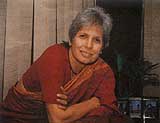A leader par excellence
Anu Aga
23 May 2002
 Every leader has his or her unique qualities and it is important for each of us to be in touch with our uniqueness rather than blindly ape someone else. My definition of success does not mean winning at work and losing at life. As I go along I will deliberate this idea further.
Every leader has his or her unique qualities and it is important for each of us to be in touch with our uniqueness rather than blindly ape someone else. My definition of success does not mean winning at work and losing at life. As I go along I will deliberate this idea further.
Rohinton as a leader had faith in himself that he could make a difference and willingness to work hard towards this belief.
Rohinton was the only child brought up in a middle class joint family in Karachi. His parents valued education and believed that through education Rohinton would do well in life. He got double promotions and finished school at 13. He moved to Mumbai for his B Com college education and came first in the university. With scholarships and loans he left Indian shores to become a chartered accountant in London. After one year of ticking with red and blue pencils he was disenchanted with being a CA and applied to Cambridge University to study for the economic tripos degree. He found the three years at Cambridge very meaningful.
| On his return he joined Burmah-Shell in the senior cadre. The pay, the perks and the titles were excellent but he found the work not challenging and before he could be trapped in golden chains, he quit. | |
 | He would have loved to pursue a career in teaching but his financial commitments moved him towards a career in the corporate world. In those days he had the responsibility to take care of his parents (by now his father had turned blind) and he had to pay back his educational loans. This brings us to another quality of a leader: he honours all his commitments — either made to himself or to the outside world. At work this commitment got translated into his employees, his customers and his suppliers. What gave him sleepless nights |
| Aga, 56, is the chairperson of | |
| was not an order lost but a customer let down and a complaint unfulfilled. Since he encouraged innovation and there were many FOAKs, he was prepared for the financial cost of making changes till the customer was satisfied. | |
After we went public someone said that now he could relax, but he said: "Now I have to be extra careful not to betray the trust the shareholders have bestowed on my company."
After Burmah-Shell he joined Duncan Jute Mills in Kolkata. My brother and Rohinton were good friends and my brother was very keen that Rohinton join our family business. At that stage it was a small, unknown unit in Bombay's Naigaon, making sterlizers and hospital furniture. There were public, smelly toilets opposite the factory and the entire ambience was very different from Burmah-Shell or Duncan. In spite of being offered a lower salary and no fancy perks, Rohinton took up the challenge to work for my father because he had confidence in his ability to make a difference.
 Another quality Rohinton displayed as a leader was his faith in people and their ability to make a difference. With his vision and passion for work he was able to attract and retain talent. With empowerment and freedom Thermax became an engineering company despite Rohinton not being an engineer. The non-hierarchical, informal and challenging culture he created enticed many employees to give out their best and have a sense of ownership towards the company.
Another quality Rohinton displayed as a leader was his faith in people and their ability to make a difference. With his vision and passion for work he was able to attract and retain talent. With empowerment and freedom Thermax became an engineering company despite Rohinton not being an engineer. The non-hierarchical, informal and challenging culture he created enticed many employees to give out their best and have a sense of ownership towards the company.
